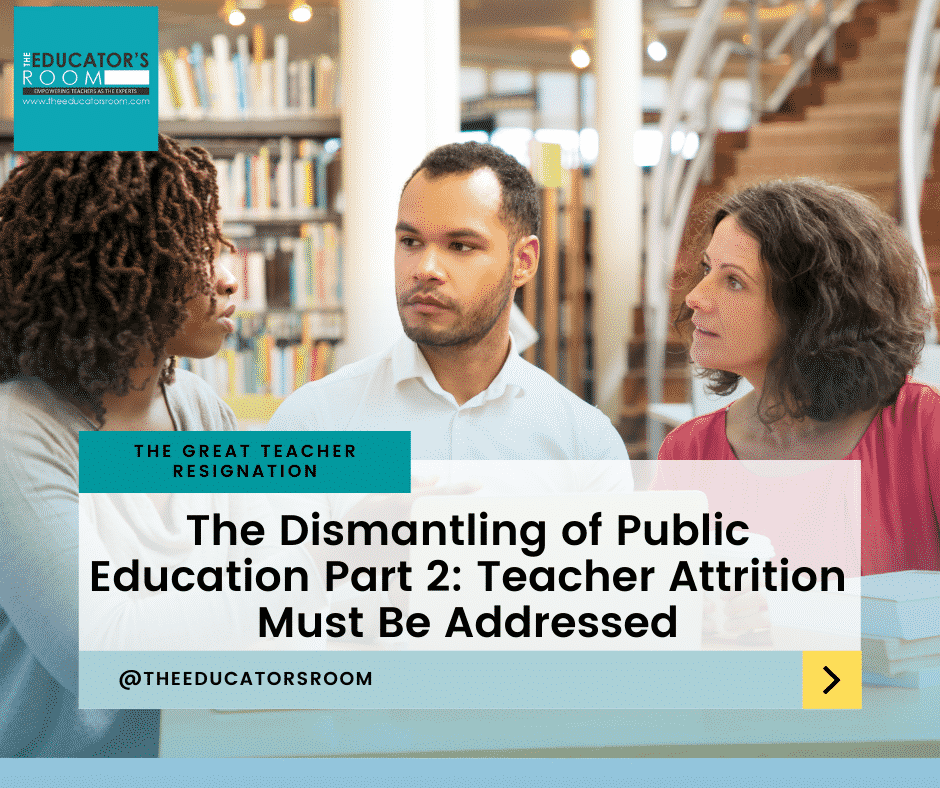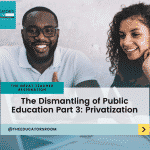Have you signed up for The Educator’s Room Daily Newsletter? Click here and support independent journalism!
In March of 2020, when schools suddenly closed their doors with no idea of what the rest of the school year (or three for that matter) would look like, none of us could have predicted the immense impact on education it would have. Sure, it seems evident that things would change. But in the early days of the pandemic, those conversations centered around equitable internet access and modernizing teaching with technology. Those conversations did not concern themselves with massive media outrage against teachers or the flipping of school boards to appease the voices of the few.
When the pandemic started, being a teacher wasn’t so bad. Spring break ended up being a little longer while districts figured out what the heck they were going to do, and then we worked hard to provide remote learning without warning, much to the appreciation of parents. I remember the days of feel-good videos about teachers and how we were the heroes for connecting with students and attempting to teach through so much uncertainty.
Over the summer of 2020, the tides began to change. Though the pandemic was nowhere near over, people were ready to get back to normal. As the new school year began, there was still some caution around the virus, and care was extended to school staff. There were surveys given out by districts asking teachers what guidelines they would feel safe working within and many provided remote options for staff to stay home if they worried for their health. But that quickly changed.
Suddenly, the narrative had been flipped. Districts had asked teachers what they needed to feel safe, and then many chose to ignore the overwhelming results. Oftentimes parent opinions were weighed far more heavily than staff and even student voices. Anyone who has been in education for a while can attest to this – there is a different pandemic raging in schools: bowing to the requests of parents.The Covid-19 pandemic only exacerbated this problem.
Parents knew it too, and soon, the loudest minority became emboldened. It started with parents threatening to pull students out of the local public schools for implementing mask mandates or other health protocols. This was a huge deal in many states where charter schools operate and have been competing for public school funding for years. Yet, even two years later, enrollment and funding concerns remain: parents pulling students out is risky for public schools, and many would rather appease than lose out.
Parents also realized that they could wield even more power with school boards. First, they began attending meetings, offering their opinions, and then protesting their decisions. In some places, these protests devolved into unrest and threats that deeply impacted the democratic process of school board meetings. But, unfortunately, they also took to heart the old saying: if you can’t beat ‘em, join ‘em.
Now there has been a slew of enraged, anti-mask (among other polarizing political opinions) advocates running for school board. Perhaps most troubling is the emerging systemic effort to recall progressive school board members to be replaced with these right-wing individuals. Money is being poured into this push for less progressive board members who align themselves with recent stances like anti-vax, book banning, and restricting teacher autonomy. But do they truly represent the broader opinions of the school communities they are meant to represent? Many parents are starting to speak up and say no. It is worth stating the obvious: school boards represent their community and are ultimately the most accessible democratic leg of public schools. I sincerely hope we do not lose that to the pandemic too.
The pandemic has further set the stage for dismantling public education. As schools feel anxiety around enrollment and funding – they face a choice of appeasing parents who may not represent the greater school community or seeing budget cuts and scrutiny from above. And as school boards (which have until now been the boring, forgotten part of public schools) continue to see literal and political threats, the choices become limited in how schools can run. From safety protocols to salaries and retention, board members hold more power than previously realized.




